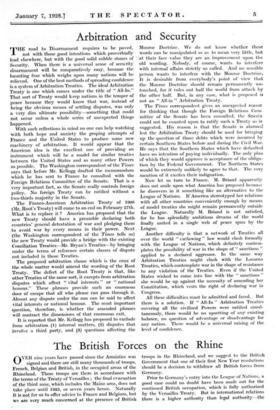Arbitration and Security
T4c road to Disarmament requires to be paved, not with those good intentions which proverbially lead elsewhere, but with the good solid cobble stones of Security. When there is a universal sense of security disarmament will be comparatively easy, because the haunting fear which weighs upon many nations will be relieved. One of the best methods of spreading confidence is a system of Arbitration Treaties. The ideal Arbitration Treaty is one which comes under the title of " All-In." That sort of Treaty would keep nations in the temper of peace because they would know that war, instead of being the obvious means of settling disputes, was only a very dim ultimate possibility—something that could not occur unless a whole series of unexpected things happened.
With such reflections in mind no one can help watching with both hope and anxiety the groping attempts of France and the United States to produce some new machinery of arbitration. It would appear that the American idea is the excellent one of providing an instrument which will be a model for similar treaties between the United States and as many other Powers as possible. The Washington correspondent of the Times says that before Mr. Kellogg drafted the memorandum which he has sent to France he consulted with the . Foreign Relations Committee of the Senate. That is a very important fact, as the. Senate really controls foreign policy, No foreign. Treaty can be ratified without a .two-thirds majority in the Senate.
The Franco-American Arbitration Treaty of 1908 (NU, foot's Treaty) will come to an end on February 27th. What is to replace it ? America has proposed that •the new Treaty should have a preamble declaring • both countries' general detestation of war and pledging them to avoid war by every means in their power. Next (the Washington correspondent of the Times tells us) the new Treaty would provide a bridge with the existing Conciliation Treaties—Mr. Bryan's Treaties—by bringing under the terms of reference certain classes of dispute not included in those Treaties.
The proposed arbitration clause which is the crux of the whole matter would amend the wording of the Root Treaty. The defect of the Root Treaty is that, like other Treaties of the same sort, it excepts from arbitration disputes which affect " vital interests " or " national honour." These phrases provide such an enormous door of escape that all who please can pass through it. Almost any dispute under the sun can be said to affect vital interests or national honour. The most important question, therefore, is whether the amended phrases will contract the dimensions of that enormous exit.
It is reported that Mr. Kellogg has proposed to exclude from arbitration (1) internal matters, (2) disputes that involve a third party, and (3) questions affecting the Monroe Doctrine. We do not know whether these words can be manipulated so as to mean very little, but at their face value they are an improvement upon the old wording. Nobody, of course, wants to interfere with internal affairs strictly so called. And no sensible person wants to interfere with the Monroe Doctrine.
It is desirable from everybody's point of view that the Monroe Doctrine should remain permanently un- touched, for it rules out half the world from attack by the other half. But, in any case, what is proposed is not an " All-in " Arbitration Treaty.
The Times correspondent gives an unexpected reason for thinking that though the Foreign Relations Corn.
mittee of the Senate has been consulted, the Senate could not be counted upon to ratify such a Treaty as is suggested. His reason is that the- Senate is alarmed lest the Arbitration Treaty should be used for bringing up the question of those debts which were incurred by certain Southern States before and during the Civil War.
He says that the Southern States which have defaulted have no intention of paying individually. The only plan of which they would approve is acceptance of the obliga- tion by the Federal Government. The Northern States would be extremely unlikely to agree to that. The very mention of it excites their indignation. • Now let us turn to France. M. Briand apparently does not smile upon what America has proposed because he discovers in it something like an alternative to the League of Nations. If America stereotyped her relations with all other countries conveniently enough by means of model treaties she might remain permanently outside the League. Naturally M. Briand is not satisfied, for he has splendidly ambitious dreams of the world finally united in a single web of peace spun by the League.
Another difficulty is that a network of Treaties all over the world " outlawing " law would clash formally with the League of Nations, which definitely contem- plates the possibility of war in the shape of " sanctions " applied to a declared aggressor. In the same way Arbitration Treaties might clash with the Locarno Treaties, which contemplate war in the shape of resistance to any violation of the Treaties. Even if the United States wished to come into line with the " sanctions " she would be up against the necessity of amending her Constitution, which vests the right of declaring war in Congress.
All these difficulties must be admitted and faced. But there is a solution. • If " All-In " Arbitration Treaties .covering all the civilized Powers were ratified simul- taneously, there would be no upsetting of any existing balance, no question of advantage or disadvantage for any nation. There would be a universal raising of the level of confidence.






































 Previous page
Previous page